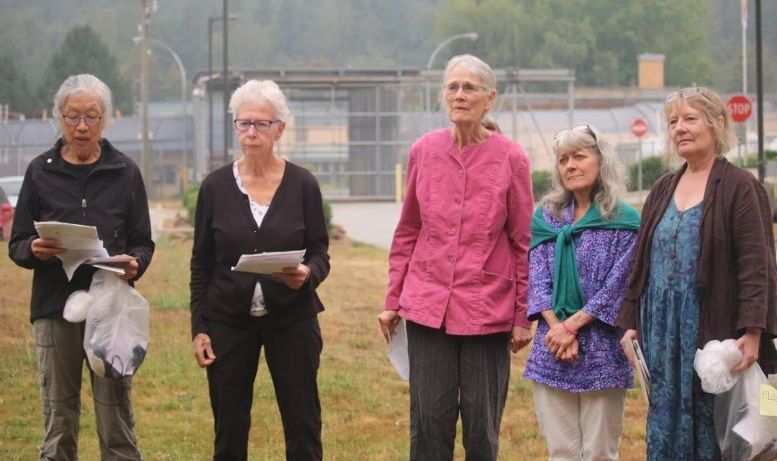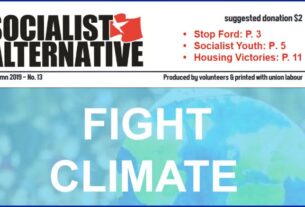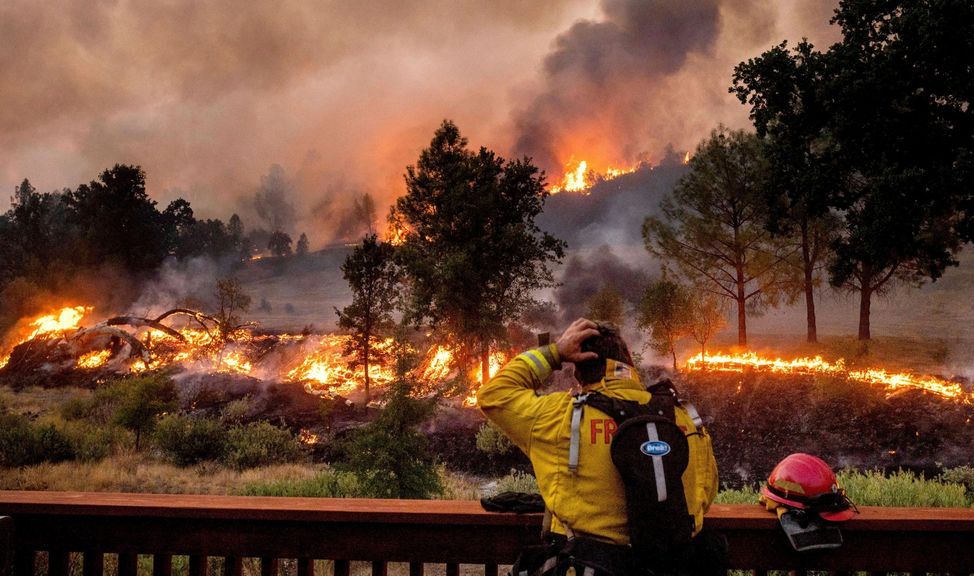Trudeau’s carbon bomb has arrived. At the end of May, the first tankers started shipping diluted bitumen from the Trans Mountain pipeline (TMX). The expanded pipeline will be able to fill 34 tankers every month, compared to the previous capacity of 5 a month. All this extra fuel will add to the CO2 in the atmosphere, further increasing climate disasters.
The month of May also saw the first evacuation orders of Canada’s forest fire season with people fleeing from Fort McMurray, Alberta, Fort Nelson, BC, and Cranberry Portage in Manitoba. Much of Canada, from Ontario west, is suffering drought, after another dry winter.
2023 was the worst year in history for forest fires in Canada, burning 18.5 million hectares. The fires released 410 million metric tons of carbon dioxide, more than the UK total of 353 million metric tons in 2021, which in turn boosts the risk of further climate disasters.
There are real fears that the 2024 fire season could be as bad as that of 2023, with the reduced snowpack, a dry winter and extra dry forests. Yet the Trudeau government went ahead to add to the dangers.
Dangerous Pipeline
As well as the inevitable, and damaging increase of fossil fuels burned, the pipeline poses many other ecological dangers.
It passes through rugged mountains, prone to landslides and with high risks of earthquakes. It crosses multiple salmon-bearing streams and rivers; a leak would add to the existing stresses on the salmon. Even in more stable landscapes pipelines leak. On the flat plains of Kansas, the Keystone pipeline leaked 14,000 barrels of oil in 2022.
The TMX pipeline does not carry crude oil, it carries diluted bitumen (dilbit), which poses extra challenges in trying to clean up spills. Bitumen resembles tar; to make it flow in a pipeline a cocktail of chemicals is added, including naphtha, which is hazardous to health. Cleaning up the spill of 24,000 barrels of Alberta’s diluted bitumen from an Enbridge pipeline into the Kalamazoo River (again in a flat stable landscape) in 2010 took more than five years and cost over US$1 billion.
A spill in Vancouver’s harbour could be devastating. Beaches and water would be contaminated by dilbit, impacting wildlife and many jobs. Tourism, fishing, hotels, shipping and recreation would all be impacted — with thousands of person-years of work destroyed. Costs to the City of Vancouver alone are estimated at $1 billion, with wider costs of $2.2 to $4.4 billion. In the event of spill it is estimated that between 25,000 and 100,000 people would need to evacuate.
The increase of tanker traffic from the port of Vancouver will add pressure to the already endangered southern resident orca population.
An Expensive Pipeline
The pipeline cost over $35 billion to build! When Kinder Morgan proposed the expansion in 2013, it claimed it would cost $5.4 billion. Much of the huge cost overrun was blamed on the terrain; the company complained about the “challenging terrain and geography,” yet the mountains and rivers were all there before the pipeline was proposed.
Ramanan Krishnamoorti, a professor of petroleum engineering, stated that “I really think they have seriously misplanned this entire adventure. We all anticipate a 25-per cent [increase] — but if you miss it by a factor of two, you should be out of a job, and if you miss it out of a factor of six, you should be out of a job many times over, instantaneously.”
The oil companies who will ship oil through the pipe are in dispute with TMX, as it has jacked up what it wants to charge them to use it. As the Canadian government owns the pipeline, we, the taxpayers, will be on the hook for the losses.
The Liberal government is looking to sell TMX but is highly unlikely it will ever recover the $35 billion spent on it. One option gaining wide political enthusiasm is to sell part or all of it to Indigenous businesses. This so-called “economic reconciliation” would provide great political propaganda to the fossil fuel industry.
Jobs
According to the original proposal the completed pipeline would provide an additional 50 jobs in BC and 40 in Alberta. The pipeline was never about jobs. It was to boost the already high profits of the oil companies — $63 billion in 2022. They hope for higher prices for dilbit on the world market, than they are receiving in the US market, where up to now most of Alberta’s oil went.
Through accelerating climate change it will “create” jobs — firefighters, first responders, construction workers — to repair and replace damaged and destroyed infrastructure and buildings, but these jobs will not cost the oil companies a cent.
The threat to jobs from an oil spill in Vancouver’s harbour outweighs any claimed job benefits. A 2016 study estimated that up to 200,000 jobs would be endangered.
The same billions of dollars would have provided far more long-term jobs if invested in renewable energy, upgrading buildings, and public transit infrastructure, while also benefiting the environment.
Mass Resistance Defeated
Almost from the start, Kinder Morgan’s pipeline faced opposition. Many Indigenous nations along its route wanted nothing to do with it. Environmentalists and municipalities in Metro Vancouver were opposed.
Multiple tactics were tried to stop this ecological disaster from going ahead. Some showed extreme naivete. Early on Green Party members gave out postcards to send to Trudeau after the Liberals were elected in 2015, urging him to stop the pipeline, as if a few thousand postcards would sway the government. Trudeau gave the greenlight to the pipeline in 2015.
The BC NDP in the 2017 election stated it would “use every tool in the toolbox” to stop Kinder Morgan. The NDP would not go far on a job site, as it had virtually no tools. It tried the courts, but the courts stated the province had no authority over the project. So instead, the NDP government issued permits for the construction. It didn’t stop the RCMP (paid for by the province and required by contract between the RCMP and the province to carry out the “objectives, priorities and goals as determined by the Provincial Minister” (Clause G)), from arresting people.
There were multiple court cases brought by First Nations and others. These cases did delay the construction but did not stop it. The Supreme Court ruled, in August 2018, that Kinder Morgan did not have to abide by the City of Burnaby’s laws, even though the pipeline’s terminus is in Burnaby. No doubt if a person ignored a city’s laws the court would take a different view, but companies have more rights than people, according to Canada’s legal system.
There were waves of protests, large demonstrations, attempted blockades, construction of tiny houses along the route of the pipeline, tree-sitting and more.
The courts supported Kinder Morgan with an injunction to stop protests along the construction route, and the RCMP happily arrested people. In 2014, the cases of over one hundred people arrested were thrown out as Kinder Morgan was so incompetent it did not provide the correct GPS locations for the injunction.
More arrests continued, including Indigenous leaders, MPs and hundreds of ordinary people. In a second wave of court cases in 2018, the prosecutor complained that seniors willing to get arrested was a “particularly sinister challenge to the court’s authority.” The Judge steadily increased the penalties, including imprisoning Jean Swanson, a COPE city councillor in Vancouver, Susan Lambert, former President of the BC Teachers Union and many others.
Finally in August 2018, the Federal Court of Appeal overturned approval of the pipeline, a case brought by seven First Nations, the cities of Burnaby and Vancouver and environmental organizations.
Trudeau Buys the Pipeline
By this stage, Kinder Morgan, faced with mounting costs and resistance, threatened to cancel the project. This was an opportunity for Trudeau to prove his environmental credentials that he claimed at the Paris climate conference in 2015, stating “Canada is back.”
But, No! He bought the pipeline, arguing that “it is an absolute priority” to allow the export of bitumen from Alberta. Buying the pipeline was not only, or even primarily, about exporting bitumen to Asia. It was a sign to international capitalism that Canada was open for business, to mine and extract the raw materials, and that Indigenous rights and protecting Canada’s and the global environment would always be of less importance than corporate profits.
With government ownership, and its almost unlimited resources, stopping the pipeline became much harder. The campaign had to up the struggle. Unfortunately, it continued the same tactics of protest and faced more arrests and longer sentences from the compliant courts.
Dogwood, a major environmental non-government organization with a budget of over $1.5 million dollars, stated that “they ground us down.”
The ruling class will use all their tools to get its way. The working class, Indigenous people and environmentalists need to develop tools that can overcome the ruling class, or the ecological disaster is inevitable.
Canada Carbon Pimp
In March 2015, Socialist Alternative published an article entitled Harper: Carbon Pimp to the World. After nearly a decade of Liberal government, Canada is exporting more carbon then in 2015. Trudeau, despite all his fine but empty words, is a bigger carbon pimp than Harper!
In 2015 Canada exported around 25 million tonnes of coal a year, making it the world’s 8th largest exporter. In 2022 this had increased to 36 million tonnes and Canada was the 7th largest exporter (some of the coal exported is mined in the US). Canada exported around 60 billion cubic metres a year over a decade ago. In 2022 this had soared to 85 billion cubic metres a year. Canada is now the sixth largest exporter of coal in the world. Exports will increase when the Kitimat LNG plant opens in 2025 (subsidized by the BC NDP government), with a capacity of 19 billion cubic metres a year. In 2014, Canada was the ninth largest exporter of oil in the world, shipping 3.5 million barrels a day. In 2022, Canada jumped to the world’s third largest exporter of oil, with 4.7 million barrels a day. Now that TMX has opened it will increase even further.
Future Defence of the Environment
Socialist Alternative took part in many demos and protests. In September 2017, as it became very clear that the federal Liberals were fully committed to building the pipeline (they bought it the next year), our magazine outlined a strategy to defeat Trudeau and the pipeline.
“If court cases, blockades and persuasion are not enough to stop the pipeline, then economic pressure is necessary. A major oil spill in Vancouver harbour would be a disaster for jobs and the economy — Vancouver would come to a standstill. To prevent this huge damage, a one-day standstill in Metro Vancouver is entirely appropriate. Imagine if the Union of British Columbia Indian Chiefs, the BC Federation of Labour, the NDP, and the Mayors of Vancouver, Burnaby and other municipalities called for a one-day shutdown of Metro Vancouver. The economic pressure on Trudeau would be huge.”
After the success of the government and the fossil fuel climate disaster industry in building the pipeline and pushing ahead with other climate damaging projects, it is clear that actions to protect a healthy planet need to widen beyond marches and rallies to applying economic pressures on big business and its government.
Stopping climate change will need a total transformation of the economy, a transformation that only a socialist society can carry out. It would be a revolution that guarantees both good jobs and a healthy environment. That is what Socialist Alternative is organizing to achieve. If you agree, join us!




